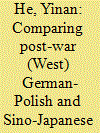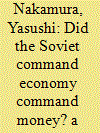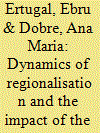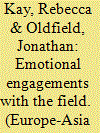| Srl | Item |
| 1 |
ID:
108066


|
|
|
|
|
| Publication |
2011.
|
| Summary/Abstract |
The article argues that the harmonisation of national memories facilitates genuine reconciliation, while memory divergence resulting from national mythmaking hampers reconciliation. After World War II, Sino-Japanese and West German-Polish relations were antagonised by the Cold War structure, and pernicious myths prevailed in national collective memory. Then China and Japan brushed aside historical legacy for immediate diplomatic normalisation, but their reconciliation was impeded by elite mythmaking practices. Since the 1970s West Germany and Poland have de-mythified war history and engaged in historical settlement, paving the way for deep reconciliation after the Cold War.
|
|
|
|
|
|
|
|
|
|
|
|
|
|
|
|
| 2 |
ID:
108065


|
|
|
|
|
| Publication |
2011.
|
| Summary/Abstract |
Motivated by recent studies reviewing Soviet money and enlarging the availability of monetary data, this study empirically investigates the Soviet monetary management mechanism: the division of cash and non-cash, and the income and outlay balance. An analysis of correlation between cash and non-cash shows that the division was largely effective, while a calculation of unexpected cash issues indicates that the income and outlay balance was useless. The results suggest that the Soviet monetary management did not work as intended because wages and output were not equilibrated from the beginning, and information and operational instruments to correct monetary imbalances did not exist.
|
|
|
|
|
|
|
|
|
|
|
|
|
|
|
|
| 3 |
ID:
108068


|
|
|
|
|
| Publication |
2011.
|
| Summary/Abstract |
This article examines the institutional and governance effects of regional policy reforms in Romania and Turkey during their respective periods as EU candidate countries. First, the article aims to disentangle the relative impact of EU conditionality in the area of regional policy in two candidate countries from different enlargement rounds. Second, it aims to investigate the outcomes of regional reforms while identifying the factors facilitating these reforms. The findings suggest that regional reform outcomes in Romania and Turkey show striking similarities, despite differences in the credibility of EU conditionality. Therefore, it argues that the constellations of domestic political actors and the existing domestic institutional structures matter more than EU conditionality in explaining the similarity in reform outcomes.
|
|
|
|
|
|
|
|
|
|
|
|
|
|
|
|
| 4 |
ID:
108073


|
|
|
|
|
| Publication |
2011.
|
| Summary/Abstract |
This article underlines the potential for multi-disciplinary area studies to provide a stimulating context within which to advance our understanding of the role that emotions play within the research process. The article seeks to argue for the relevance of emotional work with respect to research activity and, drawing from the experiences of the two authors, highlights some of the ways in which sensitivity to such matters can assist in making sense of our research experiences and findings. The article does not make any claim to introduce new ideas regarding the challenges involved in confronting the 'emotional' and 'subjective' in social science research; rather it is a response to a perceived lack of debate concerning such issues within the multi-disciplinary field of area studies, and particularly its published output, in spite of the vigorous discussions going on within many areas of the social sciences.
|
|
|
|
|
|
|
|
|
|
|
|
|
|
|
|
| 5 |
ID:
108069


|
|
|
|
|
| Publication |
2011.
|
| Summary/Abstract |
This article attempts to analyse the political discourse of some of the Azerbaijani elite on the Nagorno-Karabakh conflict through the lens of the views of leading members of Azerbaijani society. The information is based on personal interviews conducted with some influential members of the Azerbaijani political society in Baku in December 2001 and April 2009. The focus of the study was to analyse how Azerbaijanis (re)construct their ideas about Armenian identity and community. The Azerbaijani narration of the Nagorno-Karabakh conflict reveals how they have isolated themselves from their neighbours and from Western powers and how they legitimise their isolation.
|
|
|
|
|
|
|
|
|
|
|
|
|
|
|
|
| 6 |
ID:
108072


|
|
|
|
|
| Publication |
2011.
|
| Summary/Abstract |
Through a study of Soviet legal practices, the article examines the enforcement of coercive laws and their limitations in the Soviet command economy. New archival documentation shows the scale and scope of Stalin's coercive machinery. Firstly, we show why labour legislation assumed its specific form, based on an economic analysis of the command economy. Secondly, we identify four specific limits to the efficient enforcement of the legislation: collusion, search costs, administrative congestion and in absentia convictions. Thirdly, we provide new input to the discussion on the scale of the Gulag apparatus, showing that certain data need to be treated cautiously.
|
|
|
|
|
|
|
|
|
|
|
|
|
|
|
|